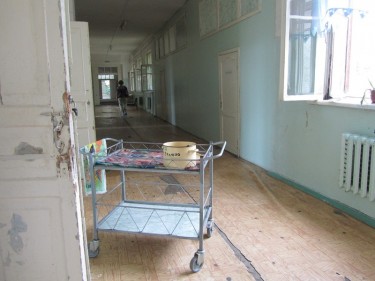Many people live their lives without an opportunity to look at everyday things from unusual perspective. Sometimes it takes traveling abroad to better understand what you have or don't have at home. But sometimes it takes a foreigner blogging about her experiences in a hospital to pinpoint the “shocking truth” about your country.
Although “a foreigner” may not be the most accurate description of a blogger dorinem [2][RUS] who was born in Ukraine and spent there 16 years before moving to Israel where she found a new home in 1993. The young women speaks perfect Russian and knows her way around the former Soviet Union. She recently traveled to Russia to visit her relatives. But sudden bleeding changed her travel plans and she found herself in a hospital in Voronezh [3] [ENG], a city in southwestern Russia.
Dorinem described her adventures in the Russian hospital on LiveJournal.com, the most popular blogging platform in the country. The blog posts became popular within days. Her recollections and quotes ended up on the pages of newspapers and magazines. Discussions that started on her blog grew into nation-wide debates on the quality of health care in Russia. And although everything that dorinem described is nothing new for many citizens of Russia, it took an outraged outsider to make people realize that getting used to something horrible doesn't make it normal.
The woman got sick in Voronezh on Saturday when it turned out to be extremely difficult to find any professional help. Here is how she described her first experience in the hospital:
Пока ждали, я смотрела по сторонам, и глаза мои лезли на лоб. Во-первых, люди, привезенные на «скорой», вылезали из «скорой» и ковыляли в регистрацию на своих двоих (кстати, совсем не маленькое расстояние). Иногда привезенные просто не могли этого сделать, и тогда по всему покою бегали санитары с криками «Нужна каталка!», а им отвечала тетка: «Каталок нет!!!», и так несколько раз по кругу. Те же счастливцы, которым каталка все же досталась, лежали на абсолютно голой незастеленной поверхности, причем раздевали для осмотра их иногда прямо в коридоре или в кабинете при открытой двери, поэтому за время ожидания мне пришлось лицезреть интимные органы нескольких людей, при том, что я совсем не собиралась этого делать. Кроме того, я видела, как везли кого-то на каталке, при этом постоянно нехило так врезаясь в углы, так что съехавшего человека постоянно приходилось поправлять, чтобы он окончательно не упал с каталки. В общем, мне показалось, что я попала в какое-то жуткое чистилище, которое было специально организовано так, чтобы еще живые люди в ужасе убегали из этого места.
It took more than an hour for dorinem to get registered at the reception desk (and she was bleeding all this time). The hospital and doctors did not cheer her up. The rooms were dirty, the doctors were unprofessional and rude and the whole atmosphere seemed to work so even a healthy person felt sick while being there. Here is the description of a medical exam:
Там стоял тазик. И в тазике плавали какие-то кровяные сгустки. Извините, но из песни слов не выкинешь. Я в полном ступоре смотрела на это. Потом повернулась к врачу и сказала дрожащим голосом: «Там… Там, в тазике, это…». Она подошла, посмотрела и сказала: «А, ну не обращайте внимания. Просто не садитесь на тазик, а вот тут, повыше». Я настолько обалдела от всего происходящего, что не нашлась, что сказать и все же полезла на кресло.
Not able to determine what was wrong with the woman, the doctors put dorinem in a hospital room with other people. The hospital did not have hot water and the patients would use plastic bottles to heat the water in the sun. The hospital also did not have towels and toilet paper. Doctors and even nurses were impossible to find during the weekend. Nothing worked and nobody wanted to do anything about it. One had to be lucky to get blood tests done and ultrasound exam was done only one day after.
The description of shocking moments experienced by dorinem in the hospital took seven long blog posts full of depressing pictures (part 1 [4], part 2 [5], part 3 [6], part 4 [7], part 5 [8], part 6 [9] and part 7 [10]).
But dorinem‘s story has a happy end. She managed to fly back to Israel alive and in a good spirit. Her blog posts now end with a wish to all readers “Don't get sick. Anywhere.”
The blogger dorinem was not the only computer-versed person who ever got sick in a Russian hospital. But she was the one who expressed her outrage in her blog and, provided that those posts were written in Russian, received enormous publicity among other bloggers and, later, with media.
“Israeli citizen on Russian Hospitals: ‘It's Purgatory that People Run From'” [11] [RUS] reads a headline in one of the most popular Russian newspaper Komsomolskaya Pravda. “Voronezh Authorities Check Information of Israeli Citizen About Violations in Health Care” [12] informs another headline of Russian information agency REGNUM. “Can Voronezh Health Care be Healed?” [13]follows up with an article Komsomolskaya Pravda.
The attention of media and authorities toward that particular hospital and toward the state of health care in Russia was sudden and motivated by the blog post. The example showed the growing influence of the Russian blogosphere when it became common for media – and sometimes for the authorities – to react to the reports written by bloggers.
The story is far from being over. The hospital in question is being investigated and evaluated by different government commissions. But one thing is for sure, as hard as it was for dorinem to be in the Russian hospital, her decision to blog about her experiences made a difference in Voronezh and motivated other people in Russia to look at their lives through the eyes of a foreigner.
